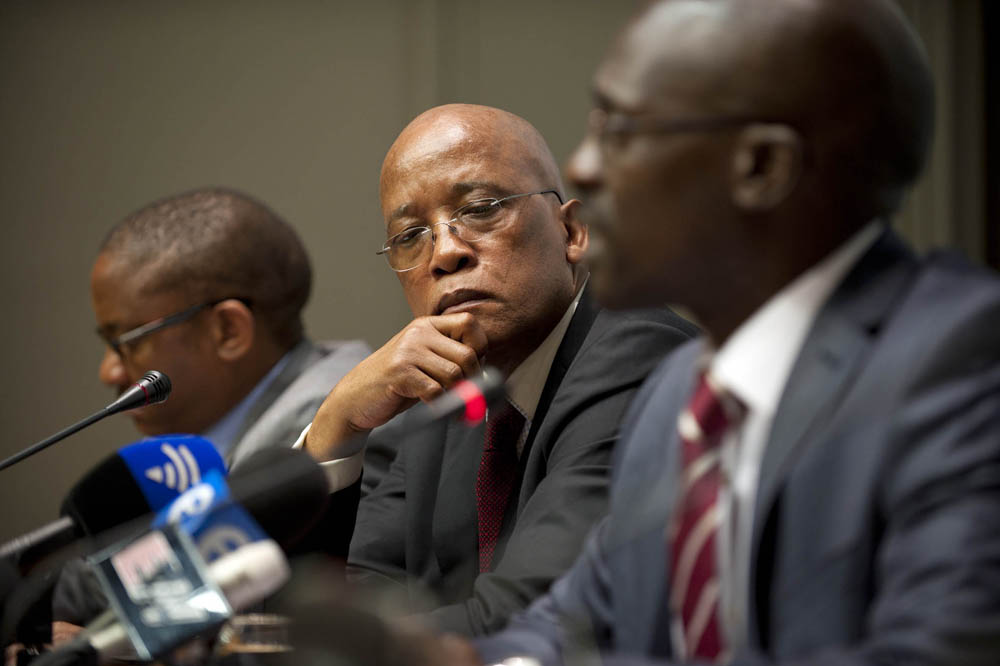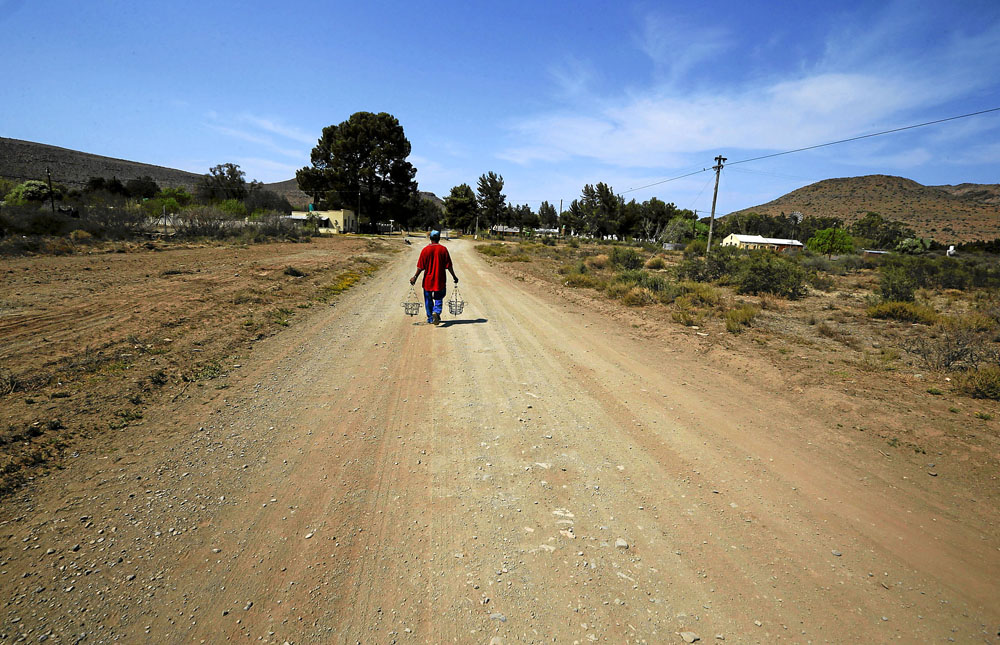In the days immediately after what turned out to be a disastrous (and subsequently repudiated) statement from Vienna that Russia will be building South Africa’s new nuclear reactors, Russian state nuclear company Rosatom appointed top local reputation managers Magna Carta on a three-month contract.
The timing was coincidental, it seems; Rosatom had started the search for a South African public relations firm in February. But Magna Carta ended up watching an angry public react to the news as it was “on-boarding” the account, in the industry parlance.
Rosatom had asked potential spin doctors to present a strategy to deal with building the Rosatom brand in general, to reach important decision-makers directly – and to prepare for crisis communications, should any be required.
Potential service providers were also asked to compile a list of South African opinion writers who could be counted on to “have a loyal attitude towards Rosatom and its activities”.
“Broadly, the strategy is to tell the Rosatom story to all targeted audiences,” said Magna Carta chief executive Vincent Magwenya in response to questions from the Mail & Guardian.
“The Rosatom story is about the company’s suitability and comprehensive offering that can contribute significantly in the effort to improve the country’s energy supply.”
Magna Carta also does work for Eskom, work Magwenya said it would continue with as there is “absolutely no conflict” in being contracted to both.
Political connectivity
Magwenya is a former spokesperson for President Jacob Zuma, but said his company does not “sell political connectivity” and has never seen a client “looking for political connectivity as a reputation management product or service”.
Magwenya would not say how much Magna Carta would be paid for an initial three-month contract, but the M&G understands the business is expected to be worth millions of rands in the medium term.
The appointment of official public relations managers is the most overt move by Rosatom to lobby around a nuclear build that has been estimated could cost up to R1?trillion, but it has been working hard since 2012 to remove French rival Areva as the lead contender in the project.
As Areva focused its lobbying on trade unions bitterly opposed to nuclear power in principle, and on Eskom, which at the time was still considered key to any decision on nuclear power, Rosatom instead turned up the charm.

Ben Martins, who was energy minister at the time, visited Russian nuclear sites last year. (David Harrison, M&G)
To prove its commitment to South Africa, Rosatom opened an office in Johannesburg in 2012, trumpeting it as only its third such offshore presence after the Ukraine and Singapore, although it was just a one-man show. According to a number of individuals involved at the time, Rosatom went shopping at the same time, looking for a combination of skills and connections that could be of use in its efforts.
It also involved the children of South African workers in the nuclear energy sector in its NucKids social responsibility project, which tours Russia and surrounds with a musical production every year.
Meanwhile, stories – seemingly scurrilous – were circulating concerning very different blandishments being employed by Rosatom. “There were a lot of rumours about people who had received kickbacks and brown envelopes, mostly from the Russians,” one former trade unionist told the M&G. “We were looking at these people and saying: ‘That one has been bought; that one has been bought’, and everyone thought there was money if you changed your position and fought for [Rosatom]. I don’t know anyone who got money, but I know there were people bitter because they didn’t get money.”
No proof
There is no proof that money actually changed hands, but a wide range of players in electricity, nuclear and energy in general this week spoke of a pervasive sense of pressure being applied by Rosatom, and a steely determination by the Russians to convince South Africa to revive its nuclear ambitions, which have been on and off since the late 1980s, with Russia as the sole partner.
At some point during 2013, the sequence of events suggests, Rosatom decided its efforts to secure the South African deal had met with success. The government this week continued to insist no commitment was ever made to the Russians. But after then energy minister Ben Martins visited various Russian nuclear sites in November 2013, media in that country were confidentially but confidently told that final contracts for the construction of Russian reactors on South African soil would be signed in February 2014.
How that conclusion could have been reached without a commitment from South Africa is puzzling, and the puzzle is complicated by the default secrecy that applies to almost every discussion involving nuclear energy in both Russia and South Africa.
A former Rosatom employee this week described the company as “very secretive, very paranoid”, and an energy analyst said the company – and decisions made in the nuclear sector in general – are “untransparent by design”. “You have to remember that these reactors started out as nuclear submarine reactors,” the analyst said. “The secrecy harks back to those days.”
Whereas South Africans with intimate knowledge cited fear of political reprisals as reason to stay anonymous, Russian sources said they could be seen as traitors to their country’s nuclear ambitions if they were identified.
Government officials this week said how the build would be financed had not yet been considered, but that the decision to build a new fleet of nuclear power stations had already been taken. At the same time they vehemently denied that Russia is being favoured, and said bidders from France, China and elsewhere will likely also be involved.
The department of energy on Wednesday said the government would not withhold any “relevant” information about the process from the public, but simultaneously would not speak about the cost of the project, how long it is expected to take to complete or even what milestones had been identified.
At various points along the process the nuclear build will be subject to legislation on secrecy in general, secrets relating to weapons and national defence, commercial confidentiality and the likes of the apartheid-era National Key Points Act.
Outside the rules
Although the Constitution implies that any procurement by the government must meet the tests of fairness, transparency and cost-effectiveness, procurement of nuclear components falls outside the usual government rules by statute.
“The procurement of a nuclear build programme is unique,” said Zizamele Mbambo, deputy director for nuclear at the energy department, at a media briefing in Pretoria. “I need to also highlight that in terms of what type of procurement process government will use to procure the nuclear build, that has not been decided.”
According to the process that the department sketched in only the broadest possible terms, South Africa will first select the nuclear technology it wants to buy, and then figure out what purchasing process will get the deal done. As each country in the running has different technology to offer, that implies that the country will be selected first, then the process will be built to suit that country, and considerations of costs will follow.
The rules of procurement, Mbambo said, would be “informed by the various countries’ national interests”.
Although the government does not officially use the phrase “geopolitical decision-making”, various insiders say that is the key to understanding the nuclear process. South Africa is intent on cementing partnerships with the Brics (Brazil, Russia, India, China and South Africa) countries; it has previously favoured Brazil for the mass roll-out of set-top boxes to make current television sets capable of handling digital broadcasts after the switch-over from analogue (although that deal went sour). Russia appears to be favoured for the nuclear build, and some say China can expect the lion’s share of the riches expected from shale gas extraction by fracking in the Karoo.
Two ANC MPs who are senior party leaders said the same way the Russia deal was pre-agreed by political heads, South Africa has already entered into an agreement with China over shale gas. “We can’t be seen buying things from the West,” the one said, and the other pointed out that the ANC is loyal to those countries that supported it during the struggle.
Although this is considered common knowledge in political circles, civil servants appeared shocked by the suggestion that even talk of a deal has surfaced. Talk about procurement for shale gas is premature, acting director general for energy Wolsey Barnard said.
“It is still a very long and technical process before we even think of procuring any technology for fracking.”
Others in that department pleaded ignorance but appeared unsurprised.
Politics trumps reason
A former member of the national executive and a member of the ANC national executive committee admitted that politics may trump reason when some deals are negotiated.
He said, “ideally”, experts within departments should make a thorough technical analysis and present their findings to their minister, who would consider all reports and options and then present them to the Cabinet.
He again said, “ideally”, there should be a robust debate on the feasibility of any deal before any definitive decision is made, but noted “government does not operate in an ideal world”.
Besides not considering the opinions of experts and civil servants qualified in the concerned areas, ANC politicians appear to disregard the opinions of their own alliance partners when signing big deals.

Fracking in the Karoo will go ahead despite stiff opposition, in another of the ANC’s deals. (Mike Hutchings, Reuters)
Cosatu said in a statement this week: “The federation has a congress resolution emphatically rejecting nuclear power as a solution and therefore objects in principle to its use. It is alarmed at the speed at which this decision has apparently been taken, with no public discussion on such an important and controversial topic, and also the secrecy surrounding it.”
It hinted the nuclear programme could go down the same route as the multibillion-rand arms deal. “In the aftermath of the arms deal controversy, it is more important than ever that there should be total transparency so we can be certain that the Public Finance Management Act is fully adhered to.”
The ANC was no different in its approach to the debate on fracking for shale gas. In April, ANC secretary general Gwede Mantashe dismissed all debate and decreed that fracking should be implemented rapidly despite the overwhelming opposition.
“We are going to do hydraulic fracturing in the Karoo. I know many people resist it, but it must be done. The United States and Canada are doing well in that area, so we need not reinvent the wheel; we must import the technology and access that gas. We need it,” he stated at the time.
When nukes and showbiz meet
While engineers from French nuclear company Areva argued with trade unionists, and its representatives all but besieged key Eskom employees, Rosatom flew two South African teenagers to a resort on the coast of the Black Sea, tutored them in musical theatre and then took them on tour.
Nuclear Kids, or just NucKids, as the project is somewhat unfortunately named, resembles a reality TV talent show stripped of the tension, drama and tears.
Nuckids 2013 from Atomenergia Info on Vimeo.

The Nuclear Kids or ‘NucKids’ step out in a TV performance. (Russian Embassy in China)
The children of nuclear workers were initially only from Russia’s “closed” nuclear cities, the Soviet-era sites where much of the modern Rosatom’s work is still done, but now include some from a small group of partner countries.
They are auditioned, trained by experts and celebrities, and then put on a full-blown musical, which one Russian journalist described as almost cloyingly cute.
In 2012, the group included the daughters of employees of the Nuclear Energy Corporation of South Africa, including some who worked on the nuclear reactor at Pelindaba. Another South African teenager joined the 2013 group. – Phillip de Wet